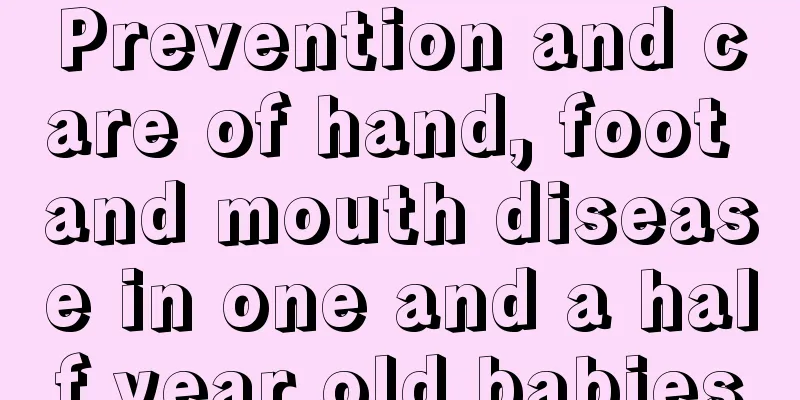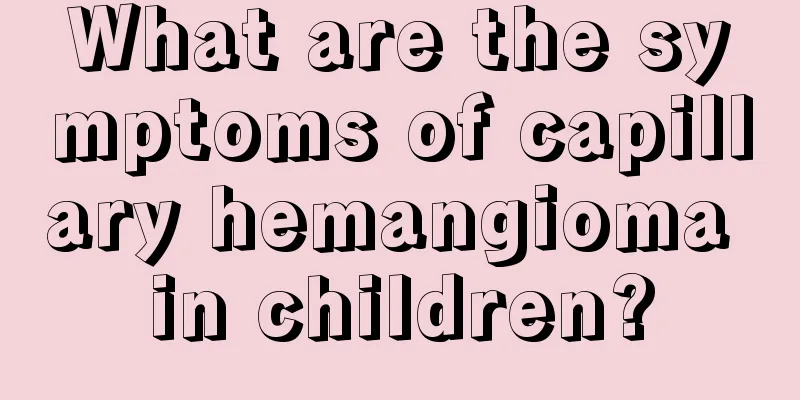What happens if a newborn is too warm?

|
After a child is born, parents are always afraid that the child will catch a cold, so they often dress the child in too many clothes or cover him with too thick a quilt. If the weather is hot, it may have a certain impact on the child, because when it is hot, the child's metabolism is faster, which can easily lead to hypoxia. At this time, it is easy for the child to suffer from infant heatstroke syndrome. Let's take a look at this aspect. What happens if a newborn is too warm? When the fever is high, the body's metabolism speeds up and the oxygen consumption increases. In addition, the lack of fresh air in the bed may cause hypoxia in children. Since young infants, especially newborns less than one month old, are unable to escape from the warm environment, the condition will often rapidly deteriorate if it continues, leading to internal environment disorders and multiple organ damage or failure. Generally, the children show symptoms of first red and then white face, crying and restlessness, slow reaction, sunken eye sockets, blue lips, and rapid and labored breathing. Due to the excessive sweating and water loss after being covered up, the cerebral blood flow is reduced, the brain tissue suffers from ischemia and hypoxia, and cerebral edema may occur secondary to it. In severe cases, ischemic necrosis of brain cells can lead to permanent damage to the central nervous system, leaving sequelae such as epilepsy and mental retardation. The disease has an acute onset and severe symptoms, and can easily affect multiple organs such as the heart, brain, kidneys, and gastrointestinal tract. The mortality rate can be as high as 18.33%, and there are many sequelae, among which secondary epilepsy is the most common, followed by cerebral palsy, blindness, aphasia, and mental retardation. Obviously, infant heat syndrome is entirely caused by human factors, and because of the serious consequences, parents should pay enough attention to it. The temperature regulation center of infants and young children is not yet fully functional, and their adaptability to the external temperature is poor, especially for infants within 150 days after birth. The heat production is very high, but the heat dissipation through sweating is relatively slow. The incoordination between heat production and heat dissipation makes infants prone to high fever under the influence of the environment. If the child keeps warm for too long, the body's heat dissipation will be affected, the body temperature will rise sharply, and the child will be in a high fever state. When the temperature is high, the peripheral blood vessels will dilate compensatorily, sweating will increase, and high fever will also cause the body's hypermetabolism and increased oxygen consumption. In addition, the child is trapped in the quilt and lacks fresh air, which leads to hypoxia. What is infant heat syndrome Infant heat syndrome is also known as stuffy syndrome, blanket syndrome, and quilt syndrome. This disease is mainly caused by over-warming the child or keeping him/her covered for too long. This can happen when the child is covered too tightly or too thickly at home, when the temperature in the room is too high, or when the child is wrapped too much or too tightly when going out. It is more common in infants under 1 year old, especially in newborns less than one month old. It usually occurs in cold seasons, with the peak period from November to April of the following year. Most of the children come from rural areas. Most children are healthy before the onset of the disease, while a few have symptoms of cold or intestinal infection such as cough, runny nose, fever, and diarrhea. The body surface area of newborns or infants is relatively larger than that of adults, so they dissipate heat faster than adults. If they are covered for too long or kept too warm, the temperature around the child's body will rise sharply. At this time, wrapping too much will affect the heat dissipation and put the body in a high fever state. At this time, the small blood vessels on the human skin may dilate compensatorily to accelerate heat dissipation through skin evaporation, that is, sweating and increased breathing, so the child will sweat a lot and even become dehydrated. |
<<: Is newborn hearing screening accurate?
>>: Bifidobacterium for neonatal jaundice
Recommend
What foods are good for a seven-month-old baby with moderate anemia?
Food occupies a very important position in life, ...
Key points for primary school students to pay attention to in their diet
For children who are in school, the learning task...
What should I do if my child has severe athlete's foot?
Many times when we take our children out to play ...
What are the functions of vitamin D for children?
Nowadays, everyone knows that vitamin D can impro...
What are the symptoms of baby spleen dampness
For babies, if symptoms of spleen dampness appear...
What should I pay attention to when feeding baby food under one year old?
When the baby is under one year old, parents need...
Why do children have red eye bags?
The healthy growth of children is the focus of pa...
What to do if a child has repeated fever due to tonsillitis? Diet therapy is effective
Tonsils are very important immune organs in our b...
What is the cause of the child's swollen eye?
It may be caused by infection, so be sure not to ...
The harm of eating adult food for babies
After the baby is 6 months old, mothers will comp...
Is it calcium deficiency if the baby twitches while sleeping?
If a baby twitches while sleeping, it may be beca...
Talk loudly in your newborn's ear
Many parents like to talk in their babies' ea...
Children's hip ultrasound
Children will always encounter various problems a...
What to do if a child has a fish bone stuck in his throat
It is easy for young children to have problems wh...
What is the cause of white spots on children's fingers?
Babies are the apple of their parents' eyes, ...









